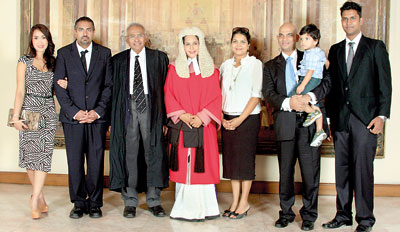News
Justice Marasinghe: Where have all the career judges gone?
View(s):Newly appointed Supreme Court Judge Rohini Marasinghe, speaking at the ceremonial sitting to welcome her to the Bench, questioned as to what had happened to the career judges in the Sri Lanka judiciary. “At present, there is only one career judge in the Supreme Court. What happened to the other career judges?” she asked.

Justice Marasinghe with her family after the ceremonial sitting. Pic by Indika Handuwala
She said that, if there is to be a judiciary that has the confidence of the public, it is essential that, the judiciary has a fair representation of those who have been nurtured in all areas of the legal profession. “I have been in the judiciary for more than three decades. It is more than 35 years since I have been called to the Bar.
It has taken more than 31 years to reach this position,” she said, adding that, there is a growing tendency to appoint officers of the Attorney General’s (AG) Department, placing these officers above career judges.
She said it is unfortunate that these judges who had more years in the judiciary had their career progressions frustrated. “I hope that, career judges who join the judicial line of progression, are given due respect for their aims and aspirations in achieving these heights, rather than being blown away and sent home early by side winds that seem to blow from parallel sources.”
She said that issues often arise with the judiciary concerning its independence, vis-à-vis in its relationship with the executive, and one of the basic requirements necessary to maintain that independence is to evoke a sense of respect from the executive, for the judiciary. “That sense of respect is often lost, once the judiciary becomes beholden to the executive, for benefits sought and benefits granted by and from the executive. Barring that, the relationship between the executive arm of government and the judiciary should be a cordial one evoking mutual respect for each other.”
Justice Marasinghe said that, sometimes, laws are made by Parliament, with a view to provide the country with security and social justice. “When such laws come before the courts, raising their Constitutional validity, the courts should take a broader view of the social policies engaged by such legislation, and show some consideration for its usefulness and its larger benefits to the country.”
She also mentioned that judges of the apex court should not consider themselves prisoners in an ivory tower. They should periodically leave such an enclosure and commence a dialogue with the executive arm of government
“Judges should value their independence above gold. Not for his or her own benefit, but because it is of the essence of the rule of law, and a judge should care passionately for the rule of law. It is the satisfaction of reaching decisions without fear or favour, affection or ill will, that makes being a judge, a vocation that…has no equal.”
Justice Marasinghe concluded by thanking the Chief Justice, Judges of the Supreme Court and the members of her family. AG Palitha Fernando, welcoming the appointment of Justice Marasinghe to the Supreme Court at the ceremonial sitting, said that, she would be looked upon by the members of the Bar and the general public with great faith and trust to dispense justice upholding the rule of law and the independence of the judiciary. “It is up to the members of the judiciary, to instill confidence in the public, that is required for the smooth functioning of the time tested judicial system of this country,” he said.
AG Fernando also said that, he is confident, she would contribute towards strengthening and consolidating the faith and trust of the general public, in the judicial system of this country. “It has been said that, impartiality is the supreme judicial virtue. A judge is expected to act impartially, without fear or favour, affection or ill will,” he said.
Follow @timesonlinelk
comments powered by Disqus

